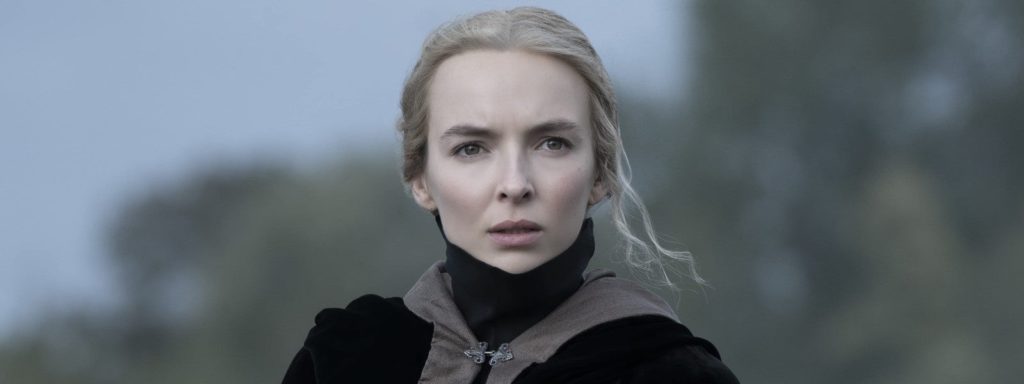
The French continental philosopher Jacques Derrida thought “the gift is impossible,” since it necessitates reciprocation and thus isn’t free. If a gift doesn’t differ from an economic transaction, it isn’t a gift. This is why we rotate who picks up the check when going out for drinks with a friend, and it’s why we only give holiday presents to those who we expect to return the favor at the appropriate time. If there were ever a hypothetical playground for Derrida’s claim about the impossibility of a gift, it’s Ridley Scott’s The Last Duel.
Divided into three perspectival chapters in fourteenth-century France, Marguerite de Thibouville (Jodie Comer), the daughter of a traitor with futile marriage prospects, espouses the elderly and heirless squire Jean de Carrouges (Matt Damon). The two men, with Marguerite at hand, come together and make amends at a mutual friend’s Medieval version of a baby shower. When Jean leaves his estate for battle in Scotland, Jacques Le Gris (Adam Driver) forces himself onto Marguerite and rapes her. Marguerite seeks justice for his crime through her only legal path, her husband. The result concludes with a historical-fictional recreation of the final duel authorized by the Parlement de Paris.
In the first two chapters, Jean and Jacques interpret every action or gift as one that entails a right to compensation. Nothing is an end, everything is a means. Nearly every interaction Jean enters into is opportunistic in this way. His main “gift conflict” concerns his dowry from Marguerite’s traitor father. He believes he’s been cheated part of the property “owed” to him in the marriage transaction—a property given by his feudal lord, Pierre d’Alençon (Ben Affleck), to Jacques. It’s his opinion that Jacques, who has recently been given control of Pierre’s finances, owes him for saving his life at the skirmish in Scotland. Jean’s broke, his friend is in charge of the finances of the man he is indebted to, so the math seems simple: Jacques is at liberty to relieve Jean of his debt, and according to Jean, this should be a moral obligation.
Jacques’ assumption is of greater consequence: his initial flirtations with Marguerite, including a kiss offered by her at the command of her husband to signal amends between the feuding parties, leads him to believe he owes her something of greater value, namely a sexual advance. While undoubtedly rape to 21st-century eyes, he interprets her resistance to him as nothing but female curtsy—after all, she expressed interest at their first encounter. He describes his sin in the sacramental confession as “adultery against a man he considered a friend.”
Marguerite, whom Scott gives the benefit of the final chapter and thus helps viewers side with her, gives nothing and receives the gift of violence. Others interpret her actions differently than they occur in her chapter (notably Jacques, but also her husband) and mistakenly think they’ve been given something: her appreciation, a flirtatious gesture, an invite for romance. From her perspective, these events were false. At the celebration of their friend’s birth announcement, Jacques envisions her kiss as the start of a gift exchange; her chapter places emphasis on her discomfort in the scene as well as the command of her husband. She is without complete agency. She’s a “gift,” not a gift-giver.
Derrida was wrong: a “gift” can be free—but only the gift of violence.
This is nothing revolutionary, admittedly. Women were treated like property throughout much of the European Middle Ages. But Claire Simpson’s tri-perspectival editing sets it apart from its fellow “the Middle Ages were misogynistic” cinematic peers. The three characters construct their own worlds. Not only does this allow for interesting psychological themes to surface, it also effectively creates each of the three main characters three times. Jean’s Marguerite, for example, is more cordial and airheaded than the swift and alert Marguerite in her version.
While some early scene transition edits felt a bit clumsy and perhaps were the result of forced cuts, the larger-scale organization more than made up for these missteps. (I can only hope there is a longer version that will find its way onto a streaming service like Netflix as a mini-series, much like The Hateful Eight.)
Several early scenes are just too short and unnecessarily suddenly divert to a new scene. I’m frankly not sure the scenes elongate or the edits smooth as the film progresses, but because of the chapter format, we come to recognize the basic events of the scenes after the first chapter, thereby mitigating the jarring effect of the crude scene-to-scene edits.
Overall though, the tri-perspective story emphatically works. It also has the benefit of making room for three excellent performances from the leads. No knocks against Damon or Driver, but relative newcomer Jodie Comer garners the most attention. And judging from her work for Scott, she’s soon going to be a regular at the Academy Awards.
Avoiding spoilers, the last shot of the film is technically simple. The camera doesn’t do much. It just centers on Comer’s face for a painfully long ten-or-so seconds as she cycles through reflection and emotion, and without saying a thing, recognizes something both mysterious and dreadful about her life to come. This final unraveling is the culmination of the best performance I’ve seen in 2021 so far.
The Last Duel
2021
dir. Ridley Scott
153 min.
The Last Duel, based on Eric Jager’s book The Last Duel: A True Story of Trial by Combat in Medieval France, begins its theatrical release on October 15.

